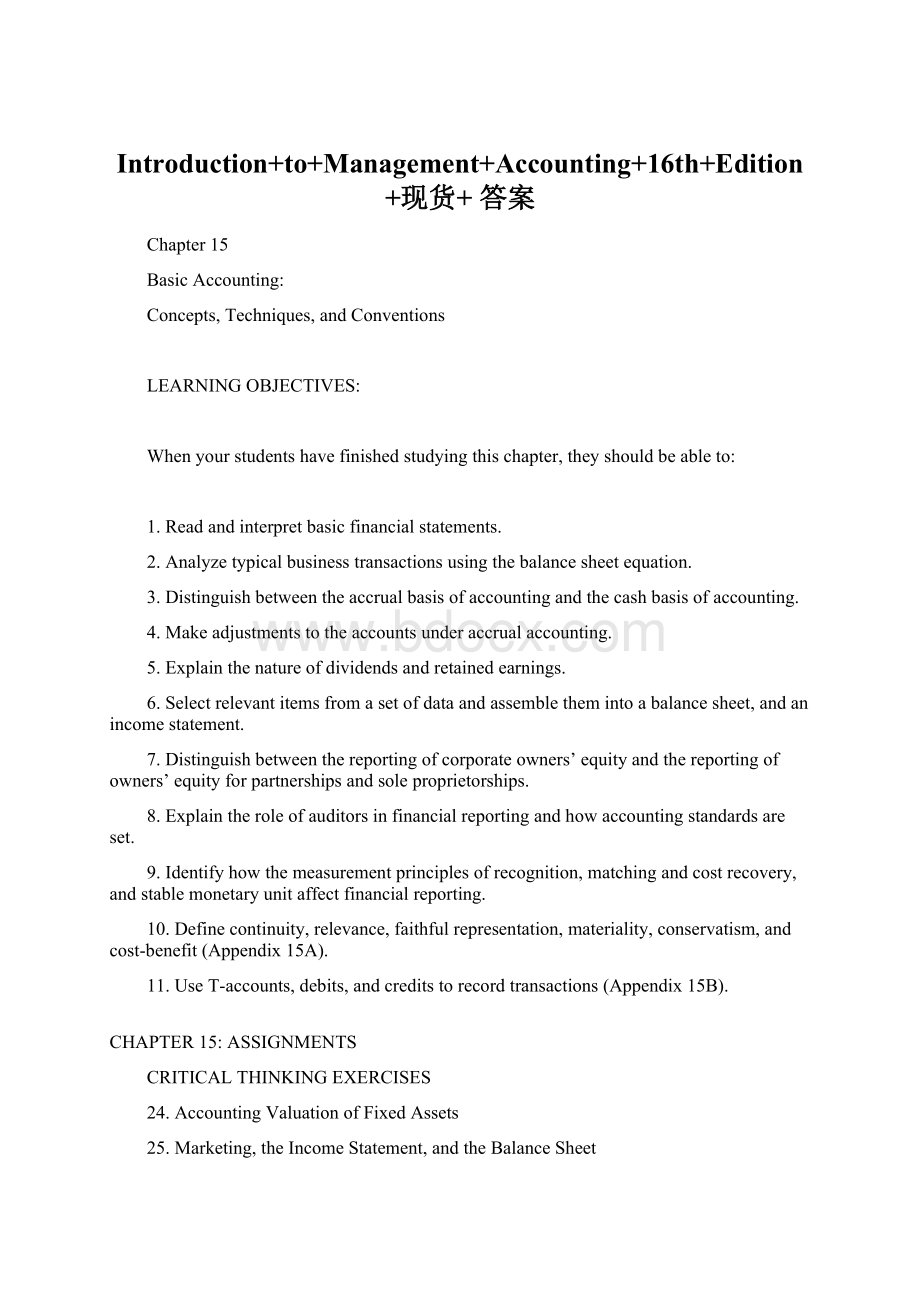Introduction+to+Management+Accounting+16th+Edition+现货+ 答案文档格式.docx
《Introduction+to+Management+Accounting+16th+Edition+现货+ 答案文档格式.docx》由会员分享,可在线阅读,更多相关《Introduction+to+Management+Accounting+16th+Edition+现货+ 答案文档格式.docx(13页珍藏版)》请在冰豆网上搜索。

4.Makeadjustmentstotheaccountsunderaccrualaccounting.
5.Explainthenatureofdividendsandretainedearnings.
6.Selectrelevantitemsfromasetofdataandassemblethemintoabalancesheet,andanincomestatement.
7.Distinguishbetweenthereportingofcorporateowners’equityandthereportingofowners’equityforpartnershipsandsoleproprietorships.
8.Explaintheroleofauditorsinfinancialreportingandhowaccountingstandardsareset.
9.Identifyhowthemeasurementprinciplesofrecognition,matchingandcostrecovery,andstablemonetaryunitaffectfinancialreporting.
10.Definecontinuity,relevance,faithfulrepresentation,materiality,conservatism,andcost-benefit(Appendix15A).
11.UseT-accounts,debits,andcreditstorecordtransactions(Appendix15B).
CHAPTER15:
ASSIGNMENTS
CRITICALTHINKINGEXERCISES
24.AccountingValuationofFixedAssets
25.Marketing,theIncomeStatement,andtheBalanceSheet
26.RevenueRecognitionandEvaluationofSalesStaff
27.RelationshipBetweentheBalanceSheetandtheIncomeStatement
28.ConceptsofRelevanceandFaithfulRepresentation
GENERALEXERCISESandPROBLEMS
29.TrueorFalse
30.SimpleBalanceSheet
31.NatureofRetainedEarnings
32.IncomeStatement
33.IncomeStatement,BalanceSheet,andDividends
34.CustomerandAirline
35.TenantandLandlord
36.Adjustments
37.FindUnknowns
38.BalanceSheetEquation:
SolvingforUnknowns
39.FundamentalTransactionAnalysisandPreparationofStatements
40.MeasurementofIncomeforTaxandOtherPurposes
41.DebitsandCredits
42.TrueorFalse
43.UseofT-Accounts
44.UseofT-Accounts
45.UseofT-Accounts
UNDERSTANDINGPUBLISHEDFINANCIALREPORTS
46.BalanceSheetEffects
47.PreparationofBalanceSheetforCostco
48.NetIncomeandRetainedEarnings
49.EarningsStatement,RetainedEarnings
50.SoleProprietorshipandCorporation
51.Nike10-KProblem:
InterpretingtheIncomeStatementandBalanceSheet
EXCELAPPLICATIONEXERCISE
52.MonthlyTransactionsUsingtheBalanceSheetEquation
COLLABORATIVELEARNINGEXERCISE
53.ImplicitTransactions
INTERNETEXERCISE
54.McDonald’sFinancialStatements
()
OUTLINE
I.TheNeedforAccounting
Accountingisthelanguageofbusiness.Managers,investors,andotherinterestedgroupsusuallywanttheanswerstotwoimportantquestionsaboutanorganization:
Howwelldidtheorganizationperformforagivenperiod?
Wheredoestheorganizationstandatagivenpoint?
Accountantsanswerthesetwoquestionswithtwomajorfinancialstatements:
anincomestatementandabalancesheet.Toobtainthesestatements,accountantsrecordanorganization’stransactions.Transaction—anyeventthataffectsthefinancialpositionofanorganizationandrequiresrecording.Throughtheyears,manyconcepts,conventions,andruleshavebeendevelopedregardingwhateventsaretoberecordedasaccountingtransactionsandhowtheirfinancialimpactismeasured.
II.FinancialStatements:
BalanceSheetandIncomeStatement{L.O.1}
Financialstatementsaresummarizedreportsofaccountingtransactions.Theycanapplytoanypointintimeandtoanyspanoftime.
BalanceSheet(moreaccuratelycalledStatementofFinancialPositionorStatementofFinancialCondition)—asnapshotoffinancialstatusataninstantoftime.Thebalancesheetequationis
assets=equities
Theequitiessideofthisequationisoftendividedintotwoparts:
assets=liabilities+owners’equity
Liabilities—theentity’seconomicobligationstononowners.Owners’Equity—theexcessoftheassetsovertheliabilities.ForCorporations(i.e.,abusinessorganizedasaseparatelegalentityandownedbyitsstockholders),owners’equityiscalledStockholders’Equity.Stockholders’equityisaresultofPaid-inCapital(i.e.,theownershipclaimarisingfromfundspaid-inbytheowners)plusRetainedEarningsorRetainedIncome(theownershipclaimarisingfromtheinvestmentofpreviousprofits).Thebalancesheetequationforcorporationsbecomes:
assets=liabilities+stockholders’equity
=liabilities+(paid-incapital+retainedearnings)
{L.O.2}SeeEXHIBIT15-1andEXHIBIT15-2forillustrationsoftheeffectsoftransactionsonthebalancesheetequation.AccountsReceivable—amountsduefromcustomersonopenaccount.AccountsPayable—amountsowedonopenaccounts.
RevenueandExpenses
Revenues—increasesinownershipclaimsarisingfromthedeliveryofgoodsorservices.Toberecognized(i.e.,formallyrecordedintheaccountingrecordsasrevenueduringthecurrentperiod),revenue
(1)mustbeearnedbyfullyrenderinggoodsorservicestocustomers,and
(2)mustberealized(i.e.,thesellermustbereasonablyassuredthattheresourcespromisedinexchangeforthegoodsorserviceswillbereceived).
Expenses—decreasesinownershipclaimsarisingfromdeliveryofgoodsorservices,orusingupassets.Profits(orEarningsofIncome)—theexcessofrevenuesoverexpenses.
Account—eachiteminafinancialstatement.Increasesinrevenuesareincreasesinstockholders’equityandincreasesinexpensesdecreasestockholders’equity.
B.RelationshipBetweenBalanceSheetandIncomeStatement
IncomeStatement—measurestheoperatingperformanceofthecorporationbymatchingitsaccomplishments(i.e.,revenuesorsales)withitsefforts(i.e.,expensessuchascostofgoodssold).Thebalancesheetshowsthefinancialpositionataninstantoftime,buttheincomestatementmeasuresperformanceforaspanoftime,whetheritbeamonth,aquarter,orlonger.Thus,theincomestatementisthemajorlinkbetweenbalancesheets.
C.TheAnalyticalPoweroftheBalanceSheetEquation
Thebalancesheetequationcanhighlightthelinkbetweentheincomestatementandthebalancesheet.Therelationshipsbetweenincomestatementitemsandthoseforthebalancesheetcanbeseenintransformingthebalancesheetequationasshownbelow:
1.assets(A)=liabilities(L)+stockholders’equity(SE)
2.A=L+paid-incapital+retainedearnings
3.A=L+paid-incapital+revenue-expenses
Revenueandexpenseaccountsaresubdivisionsofstockholders’equity(i.e.,temporarystockholders’equityaccounts).Foreverytransaction,thebalancesheetequationisalwayskeptinbalance.
III.AccrualBasisandCashBasis{L.O.3}
AccrualBasis—recognizestheimpactoftransactionsonthefinancialstatementsintheperiodswhenrevenuesandexpensesoccurinsteadofwhencashisreceivedordisbursed.Revenuesarerecordedastheyareearnedandexpensesrecordedastheyareincurred,notnecessarilywhencashchangeshands.
CashBasis—revenueandexpenserecognitionwoulddependsolelyonthetimingofvariouscashreceiptsanddisbursements.Themajordeficiencyofthecashbasisisthatitisincomplete.Itfailstomatcheffortswithaccomplishments(expensesandrevenues)inamannerthatproperlymeasureseconomicperformanceandfinancialposition.Itomitskeyassets(suchasaccountsreceivableandprepaidrent)andkeyliabilities(suchasaccountspayable)fromthebalancesheets.
A.NonprofitOrganizations
Balancesheetsandincomestatementsarealsousedinnonprofitorganizations.Somehavenotadoptedalltheconventionsusedbytheirprofit-seekingcounterparts.Forinstance,somegovernmentalagenciesstillusethecashbasisofaccountingratherthantheaccrualbasis.Thelackofaccrual-basedfinancialstatementshashamperedtheevaluationoftheperformanceofsuchorganizations.
IV.AdjustmentstotheAccounts
Adjustments—recordingofimplicittransactions,incontrasttotheexplicittransactionsthattriggernearlyallday-to-dayroutineentries,attheendofeachreportingperiodinordertomeasureincomeforaccrualaccounting.Theyrefinetheaccountant’saccuracyandprovideamorecompleteandsignificantmeasureofefforts,accomplishments,andfinancialposition.Thefourcategoriesoftransactions(i.e.,economiceventsthatshouldberecordedbyanaccountant)forwhichadjustmentsarenecessaryareoutlinedbelow.SourceDocuments—explicitevidenceofanytransactionsthatoccurintheentity’soperation(e.g.,salesslipsandpurchaseinvoices).
V.AdjustmentTypeI:
ExpirationofUnexpiredCosts{L.O.4}
Assetsfrequentlyexpirebecauseofthepassageoftime.Assetsmaybeviewedasbundlesofeconomicservicesawaitingfutureuseorexpiration.Assets,otherthancashandreceivables,maybethoughtofasprepaidorstoredcoststhatarecarriedforwardtofutureperiodsratherthanimmediatelychargedagainstrevenue.Expensesareused-upassets.UnexpiredCost—anyassetthatordinarilybecomesanexpenseinfutureperiods(e.g.,inventoryandprepaidrent).
A.TimingofAssetExpiration
Someassetsexpireimmediately(e.g.,advertisingservicesandmiscellaneoussupplies).Whenthisisthecase,theusualaccountingforthemistoexpensetheminstantaneouslyratherthanrecordingthemfirstasassetsandthenexpensingthem.Thetimeatwhichassetsexpirecanbedebatable.Forexample,researchanddevelopmentcostsmustbewrittenoffasanexpenseundercurrentgenerallyacceptedaccountingprinciples.However,theymayhavesomefutureeconomicbenefit.
Depreciation
Long-livedassets(e.g.,equipmentandbuildings)havetheir